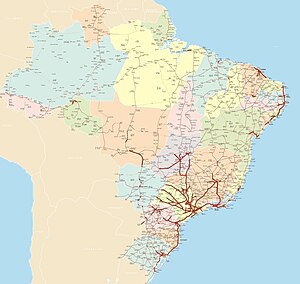
Back Brasilianske hovedveje Danish Brasilianische Fernstraßen German Rodovia French ბრაზილიის გზების სისტემა Georgian Hoofdwegen in Brazilië Dutch Brasilianske hovedveier NB Transporte rodoviário no Brasil Portuguese

The Brazilian Highway System (Portuguese: Sistema Nacional de Rodovias) is a network of trunk roads administered by the Ministry of Transport of Brazil. It is constructed, managed and maintained by the National Department of Transport Infrastructure (DNIT), a federal agency linked to the Ministry of Infrastructure, and the public works departments of state governments.
The National Travel System (Portuguese: Sistema Nacional de Viação – SNV) comprises the road infrastructure and the operational structure of the different means of transporting people and goods. As for jurisdiction, the national road system is composed of the Federal Road Traffic System (Portuguese: Sistema Federal de Viação – SFV) and the road systems of the States, the Federal District and the Municipalities.
The Investment Partnership Program (PPI) is a major effort to expand and upgrade the network of highways aside with the Federal Highway Concessions Program (PROCROFE). The Ministry of Infrastructure often uses a public–private partnership model for highway maintenance, and toll-collection. Currently, the longest National Highway in Brazil is BR-116 with 4,486 km (2,787 mi).